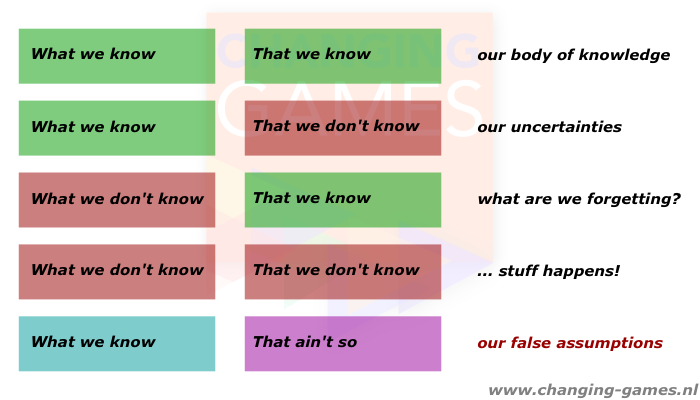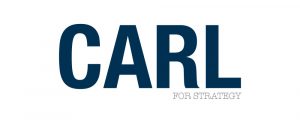5 What’s of knowledge
KNOWLEDGE is POWER. That is a truism that not spans decades, but millennia. Every business needs to know its customers, the competition, its suppliers, its surroundings, itself, etc., etc. We need to know everything. We need lots of data. BIG DATA is the answer. BIG DATA is hot.
BUT…
Business is not only about what you know. Surprises come from things you don’t know. Uncomfortable these typically are and yet some come from things you knew you didn’t know. Others feel like coming out of the nowhere. These are most unpleasant… or worse.
You cannot be certain that you know everything.
Peter Perla recently introduced me to the 5 what’s of knowledge. These range from the stuff that we know that we know all the way to the stuff that we don’t know that we don’t know. Donald Rumsfeld famously named the latter the unknown unknowns, or unkunk’s. But there is a fifth. The most nasty one of all. This is the stuff that we know, but which ain’t so. Our false assumptions.
In nearly any business setting we aim to gather all the knowledge we need for taking a decision. Take strategy development for example. There are dozens and dozens of different tools – e.g. SWOT, business canvas, GE/McKinsey-plots, 9-grids, etc, etc. – that help us structure what we know. We interpreted this and then take a decision.
I see many people fully convinced that they’re done and what remains is just to implement the decision. I also often see those same people a little later totally flabbergasted… It didn’t go as planned… why!?
The answer is simple. First of all these people end with why, rather than start with it… and continue to ask that along the way. Secondly, any situation in which you interact with, alongside, in support of or against thinking, planning, plotting, etc. human beings does not follow the laws of mathematics. Yes in human sciences they also use highly developed mathematical models. But we are not dealing with laws of nature like gravity. We are dealing with situations in which I may know that you may know, and that you may know that I may know, etc. etc… or not… That I may know that you may not know, and therefore… etc, etc… It is worse than trying to predict the weather.
The solution is easily written down: one more thing to do and adopting an attitude.
The extra thing to do is to explicitly and extensively add the things you do not know as a second list to the list of things you know. Some of these are things you do not know because you haven’t digged it up yet. If you’re pressed for time you may leave it at that, or not. Other things you simply cannot know at that time. These pieces of knowledge will/may come in their own time.
The attitude is to become comfortable with uncertainty, to accept it, to embrace it.
With the second list you still have three of the 5 what’s of knowledge up in the air. There is no way you can do anything about it. Take for example the unknown unknowns. These will come to you in their own time, not yours. You may also try to involve everybody and everything, and still encounter an “aha, so we knew it already” moment. It happens.
After we made a plan and are about to start I hear many times people say: but we don’t know that yet, so… My answer: yes that is true, but we’re going to let it happen and manage as we go. Planning does not stop when the plan is ready. A plan, a strategy must be taken along into its own implementation.
Jan-Willem Boots is co-founder of Changing Games




